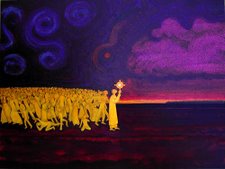
[Marc Chagall]
...
8. The flipside of an apolitical church is a sacralised state. This is “the Constantinian trap” (Lesslie Newbigin). And a sacralised state easily becomes a demonic state. The cross is draped with the flag, and discipleship is absorbed into citizenship. The German Christians are the paradigm nationalist idolaters; history repeats itself in the farce of the Religious Right. “Never was anything in this world loved too much,” wrote Thomas Traherne, “but many things have been loved in a false way, and all in too short a measure.” The true love of ecumenism trumps the sentimental love of patriotism.
9. The church’s political witness ends in the public square, but it begins around a table. At worship the church bows neither to Caesar, nor to Mammon or Mars, but to the crucified and risen One. At worship the Spirit begins to straighten our disordered desires, as we hear an alternative narrative to manifest destiny, and learn an alternative praxis to Realpolitik. Yet worship can be a bolthole rather than a sign of reconciliation and resistance. “Where the body is not properly discerned, Paul reminds the Corinthians, consumption of the Eucharist can make you sick or kill you (1 Cor. 11:30). This might explain the condition of some of our churches” (William T. Cavanaugh).
10. The Apocalypse of John is “a visionary theological and poetic representation of the spiritual environment within which the church perennially finds itself living and struggling” (Richard B. Hays). It is a samizdat text of protest to the pretensions of power, a warning against complacency, and a call to discernment in reading the signs of the times. The powerful inevitably twist it into a self-serving mandate for accumulation and aggression; only those who long for justice and peace see that the hermeneutical key is the slaughtered Lamb who gently roars. Here is the text for a political theology that begins to re-imagine and re-shape the world in anticipation of the parousia of Christ.
Post-9/11 Postscript
In Apocalypse Now: Reflections on Faith in a Time of Terror (2005), Duncan Forrester proposes an interesting juxtaposition: on the one hand, the statement of support for the Kaiser published by a group of ninety-three leading German intellectuals, including theologians, on the day the First World War broke out; on the other hand, the public “Letter from America: What We Are Fighting For” in support of President Bush’s “war on terror,” signed by sixty prominent American intellectuals, including theologians, five months after 9/11. Both letters are so theologically thin, however, that they amount to pom-pom propaganda for imperial states. The first letter awoke Karl Barth from his Schleiermacherian slumbers, the second letter aroused Stanley Hauerwas and Paul Griffiths to a polemical response. But by and large the people of Germany and the US sleepwalked into slaughter. Moral: When political theology is faithful, expect it to be critical and subversive; when it is unfaithful, expect it to be ideological and fatal.
Labels: ethics, Kim Fabricius, politics
posted by Ben Myers at 8:00 AM
35 Comments:



2 comments:
You may have not intended to do so, but I think you have managed to express the state of mind that a lot of people are in. The sense of wanting to help, but not knowing how or where, is something a lot of us are going through. Please come visit my site inventory management articles
when you got time.
I am not really sure if best practices have emerged around things like that, but I am sure that your great job is clearly identifed. I was wondering if you offer any subscription to your RSS feeds as I would be very interested and can’t find any link to subscribe here. Please come visit my site lean production
give me any valuable feedbacks.
Post a Comment